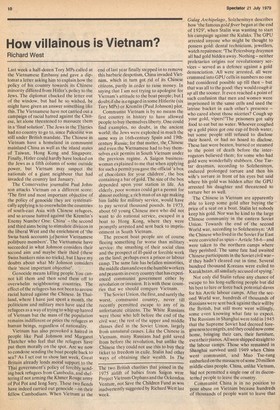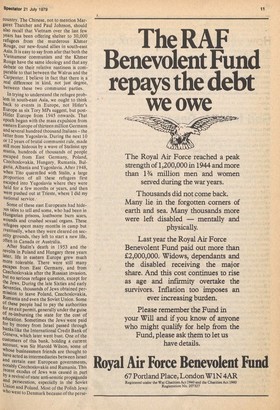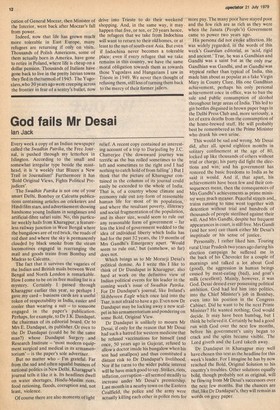How villainous is Vietnam?
Richard West
Last week a half-dozen Tory MPs called at the Vietnamese Embassy and gave a diplomat a letter asking him to explain how the policy of his country towards its Chinese minority differed from Hitler's policy to the Jews. The diplomat chucked the letter out of the window, but had he so wished, he might have given an answer something like this. The Vietnamese have not carried out a campaign of racial hatred against the Chinese, let alone threatened to massacre them in a 'final solution'. The Jews in the Thirties had no country to go to, since Palestine was still under British mandate. The Chinese in Vietnam have a homeland in communist mainland China as well as the island states of Taiwan, Hong Kong and Singapore. Finally, Hitler could hardly have looked on the Jews as a fifth column of some outside power, but Vietnam may suspect the nationals of a giant neighbour that had invaded the country last January.
The Conservative journalist Paul John, son attacks Vietnam on a different score: 'The first and most important objective of the policy of genocide they are systematically applying is to overwhelm the countries of south-east Asia with Chinese refugees, and so arouse hatred against the Kremlin's Enemy Number One: China' — the second and third aims being to stimulate division in the liberal West and the enrichment of 'the Swiss bank accounts [of]senior Vietnamese politburo members'. The Vietnamese have succeeded in what Johnson considers their second aim and maybe their third (these Swiss bankers miss no tricks), but I have my doubts about what Mr Johnson considers their 'most important objective'.
Genocide means killing people.You cannot kill them and then send them off to overwhelm neighbouring countries. The effect of the refugees has not been to arouse racial hatred against the Chinese. In Thailand, where I have just spent a month, the politicians and military men have used the refugees as a way of trying to whip up hatred of Vietnam but the mass of the population remains indifferent or pities the refugees as human beings, regardless of nationality. Vietnam has also provoked a hatred in people like Paul Johnson and Margaret Thatcher who feel that the refugees have put them morally on the spot. Are we now to condone sending the boat people back to sea? As I set out to show last week, Great Britain already lends moral support to the Thai government's policy of forcibly sending back refugees from Cambodia, and sheltering if not arming the Khmer Rouge army of Pol Pot and leng Sary. These two fiends have indeed carried out genocide — on their fellow Cambodians. When Vietnam at the end of last year finally stepped in to remove this barbaric despotism, China invaded Vietnam, which in turn got rid of its Chinese citizens, partly in order to raise money. In saying that I am not trying to apologise for Vietnam's attitude to the boat people; but I doubt if she is engaged in some Hitlerite (six Tory MPs) or Kremlin (Paul Johnson) plot.
Communist Vietnam is by no means the first country in history to have allowed people to buy themselves liberty. One could find examples, no doubt, in the ancient world; the Jews were exploited in much the same way in 16th-century Spain and 19thcentury Russia; for that matter, the. Chinese and even the Vietnamese had to buy themselves exit permits in South Vietnam under the previous regime. A Saigon businesswoman explained to me that when applying for such a permit you gave the official 'a box of chocolates for your children', the box containing a bar of gold. The size of the box depended upon your station in life. An elderly, poor woman could get a permit for almost nothing; a rich man of an age making him liable for military service, would have to pay several thousand pounds. In 1973, about 60 young Chinese men who did not want to do national service, escaped in a boat to Hong Kong, where they were promptly arrested and sent back to imprisonment in South Vietnam.
The present boat people are of course fleeing something far worse than military service: the smashing of their social class and the prospect of ill-paid or forcible work on the land; perhaps even a prison or labour camp. The same fate has befallen minorities, the middle class and even the humble workers and peasants in every country that has experienced communist government either by revolution or invasion. It is with these countries that we should compare Vietnam.
The Soviet Union, the first, and surely the worst, communist country, never till recently permitted escape to any of its unfortunate citizens. The White Russians were those who left before the end of the civil war; the rest of the upper and middle classes died in the Soviet Union, largely frorii unnatural causes. Like the Chinese in Vietnam, many Russians had gold saved from before the revolution, but unlike the Chinese they could not use this to buy their ticket to freedom in exile. Stalin had other ways of obtaining their wealth. In The The two British charities that joined in the 1975 airlift of babies from Saigon were Project Vietnam Orphans and the Ockendon Venture, not Save the Children Fund as was inadvertently suggested by Richard West last week. Gulag Archipelago, Solzhenitsyn describes how 'the famous gold fever began at the end of 1929', when Stalin was wanting to start his campaign against the Kulaks. The GPU arrested anyone who might be thought to possess gold: dental technicians, jewellers, watch repairmen: 'The Petersburg draymen all had gold hidden away. Nothing— neither proletarian origins nor revolutionary services — served as a defence against a gold denunciation. All were arrested, all were crammed into GPU cells in numbers no one had considered possible up till then — but that was all to the good: they would cough it up all the sooner. It even reached a point of such confusion that men and women were imprisoned in the same cells and used the latrine bucket in each other's presence — who cared about those niceties? Cough up your gold, vipers!'The prisoners got salty food to eat but no water. Whoever coughed up a gold piece got one cup of fresh water, but some people still refused to disclose their hoard, or had no hoard to disclose. These last were beaten, burned or steamed to the point of death before the inter rogators believed them; for some who had gold were wonderfully stubborn. One Tar tar drayman, according to Solzhenitsyn, endured prolonged torture and then his wife's torture in front of his eyes but said where his gold was hidden after the GPU arrested his daughter and threatened to torture her as well.
The Chinese in Vietnam are apparently able to keep some gold after buying the ' price of a seat on a boat. Stalin let nobody keep his gold. Nor was he kind to the large Chinese community in the eastern Soviet Union. Towards the end of the second World war, according to Solzhenitsyn: 'All the Chinese who lived in the Soviet Far East were convicted as spies— Article 58-6—and were taken to the northern camps where they perished. The same fate had awaited Chinese participants in the Soviet civil war— if they hadn't cleared out in time. Several hundred thousand Koreans were exiled to Kazakhstan, all similarly accused of spying.' Not only did Stalin refuse any chance of escape to his long-suffering people but did his best to lure or force back potential slaves for his Arctic labour camps. After the second World war, hundreds of thousands of Russians were sent back against their will by the British, but still more went willingly, some even knowing what fate to expect.
The Russians in Shanghai were told in 1945 that the Supreme Soviet had decreed foregive ness to emigres, and they could now come home, bringing their cars, their furniture, even their pianos. All were shipped straight to the labour camps. Those who remained in Shanghai survived until 1949 when China went communist, and Mao Tse-tung embarked on the massacre of some 20million middle-class people. China, unlike Vietnam, had not permitted a single one of its discontented people to leave the country.
• Communist China is in no position to pour abuse on Vietnam because hundreds of thousands of people want to leave that Country, The Chinese, not to mention Margaret Thatcher and Paul Johnson, should also recall that Vietnam over the last few years has been offering shelter to 30,000 refugees from the murderous Khmer Rouge, our new-found allies in south-east Asia. It is easy to say from afar that both the Vietnamese communists and the Khmer Rouge have the same ideology and that any debate on their relative nastiness is comparable to that between the Walrus and the Carpenter. I believe in fact that there is a real difference in kind, not just. degree, between these two communist parties.
In trying to understand the refugee problem in south-east Asia, we ought to think back to events in Europe, not Hitler's Europe as six Tory MPs suggest, but postHitler Europe from 1945 onwards, That epoch began with the mass expulsion from eastern Europe of thirteen million Germans and several hundred thousand Italians— the latter from Yugoslavia. During the next 10 or 12 years of brutal communist rule, made Still more hideous by a wave of Stalinist spy mania, hundreds Of thousands of people escaped from East Germany, Poland, Czechoslovakia, Hungary, Rumania, Bulgaria, Albania and Yugoslavia. After 1948, When Tito quarrelled with Stalin, a large proportion of all these refugees first escaped into Yugoslavia where they were held for a few months or years, and then were pushed out at Trieste, where I did my national service.'
Some of these east Europeans had hide)US tales to tell and some, who had been in Hungarian prisons, loathsome burn scars, wounds and crushed sexual organs, These refugees spent many months in camp but !ventually, when they were cleared on security grounds, they left to start a new life, Often in .Canada or Australia.
After Stalin's death in 1953 and the revolts in Poland and Hungary three years later, life in eastern Europe grew much more tolerable. There were still many escapes from East Germany, and from Czechoslovakia after the Russian invasion, but no serious refugee question, except for the Jews. During the late Sixties and early Seventies, thousands of Jews obtained perMission to leave Poland, Czechoslovakia, Rumania and even the Soviet Union, Some of these people had to pay the authorities for an exit permit, generally under the guise of re-imbursing the state for the cost of education. Sometimes the Jews were paid for by money from Israel passed through banks like the International Credit Bank of Geneva, which later went bust. One of the customers of this bank, holding a current account, was Sir Harold Wilson, some of Whose businessmen friends are thought to have acted as intermediaries between Israel and certain east European governments, notably Czechoslovakia and Rumania. This iecent exodus of Jews was caused in part by a revival of state anti-semitic propaganda and persecution, especially in the Soviet Union and Poland. Most of the Polish Jews who went to Denmark because of the perse cution of General Moczar, then Minister of the Interior, went back after Moczar's fall from power.
Indeed, now that life has grown muchl more tolerable in East Europe, many refugees are returning if only on visits. Thousands of Polish Americans, some of them actually born in America, have gone to retire in Poland, where life is cheap on a dollar pension. Thousands of Italians have gone back to live in the pretty Istrian towns they'fled in thelturmoil of 1945. The Yugos lays, who 30 years ago were creeping across the frontier in fear of a sentry's bullet, now drive into Trieste to do their weekend shopping. And, in the same way, it may happen that five, or ten, or 20 years hence, the refugees that we take from Indochina will want to return to their old homes, or at least to the sun of south-east Asia. But even if Indochina never becomes a tolerable place; even if every refugee that we take remains in this country, we have the same moral obligation towards them as towards those Yugoslays and Hungarians I saw in Trieste in 1949. We never then thought of refusing them, still less of turning them back to the mercy of their former jailers. more pay. The many poor have stayed poor and the few rich are as rich as they were when the Janata (People's) Government came to power two years ago.
His persona did not evoke affection. He was widely regarded, in the words of this week's Guardian editorial, as 'acid, rigid and ancient.' True, he was a Gandhian and Gandhi was a saint but as the only true Gandhian was Gandhi, and as!Gandhil was atypical rather than typical of India, this made him about as popular as a fake Virgin Mary in County Clare. His one Gandhian achievement, perhaps his only personal achievement once in office, was to ban the sale and public consumption of alcohol throughout large areas of India. This led to gin bottles disguised in brown paper bags in the Delhi Press Club and, more seriously, a lot of extra deaths from the consumption of the home-brewed stuff. He will probably best be remembered as the Prime Minister who drank his own urine.




































 Previous page
Previous page